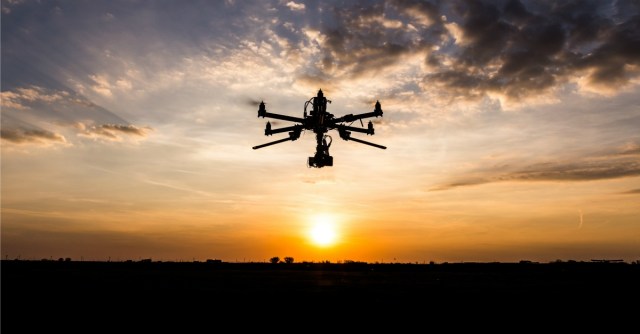Soon, Americans are likely to be seeing a lot more drones. And vice versa.
The US Federal Aviation Administration (FAA) has just released its long-awaited rules for the commercial use of lightweight drones. And those rules are extremely drone friendly.
One thing’s missing, though: any privacy safeguards. FAA says: that, we’re still working on.
The new rules focus on commercial (non-hobbyist) use of drones weighing less than 55 pounds. Commercial users will need to fly no higher than 400 feet above ground level or structures, and no faster than 100 miles per hour.
They’ll have to keep their drones within sight, and can’t fly at night. They can’t fly directly over people who aren’t involved with the flight, and generally can’t fly in controlled airspace near airports.
Flights within DC are off-limits, too (as is already the case for manned nongovernment airplanes).
Operators must be at least 16 years old, and either hold a “remote pilot airman certificate with a small UAS rating” or be “under the direct supervision” of someone who holds one. (Certificate holders get vetted by the TSA, when they’re not busily x-raying your carry-ons.)
Previously, as the BBC notes, “commercial operators needed a [regular] pilot’s licence in order to fly even small drones… and had to apply to the FAA on a case-by-case basis to gain permission.” Only about 6,000 applicants had succeeded. Starting in August, those limits go away.
Commercial drone pilots who follow these fairly straightforward rules ought to be able to stay out of the hair of airline pilots. But, as the US Air Line Pilots Association remarks, these rules don’t apply to hobbyists:
Recreational users make up the bulk of [drone flyers], yet they are virtually unregulated due to legislative conditions placed on the FAA. It is essential that all rules developed to promote the safe operation of unmanned aircraft systems must be consistent…
Given the remaining limits, we should probably not expect any Amazon delivery-by-drone services just yet.
And, as the Washington Post points out, night time applications such as roof inspections based on heat sensing will still need special authorization.
Even so, the industry sounds downright excited about these new regulations. (Not a sentence you read every day!)
In Ars Technica, Lisa Ellman – co-chair of Hogan Lovells’ drone legal practice – called it “a huge day for the industry… the flood gates will now be opened and drone use will be broadly authorized for commercial industry, so we can take advantage of all of their safety and efficiency benefits.”
Top drone maker DJI praised the FAA for “encouraging the development of transformative aerial technology while ensuring the safety of those on the ground and in the air”.
The new rules codify common sense, making it easier for a farmer to fly a drone over his fields, for a contractor to inspect property without climbing a ladder, and for a rescue service to use drones to save lives.
According to The New York Times, the FAA’s rules don’t necessarily “preclude a hodgepodge of state and local drone regulations that have popped up in recent years.” FAA would love local governments to defer, but so far, all it can do is ask nicely.
When it asks nicely, it might hear objections from privacy advocates such as Marc Rotenberg, President of the Electronic Privacy Information Center.
Rotenberg, whose organization has sued the FAA over the issue, told the Times:
The FAA continues to ignore the top concern of Americans about the deployment of commercial drones in the United States — the need for strong privacy safeguards.
According to the FAA’s news release:
Although the new rule does not specifically deal with privacy issues in the use of drones, and the FAA does not regulate how [drones] gather data on people or property, the FAA is acting to address privacy considerations…
The FAA strongly encourages all UAS pilots to check local and state laws before gathering information through remote sensing technology or photography… the agency will provide all drone users with recommended privacy guidelines… will educate all commercial drone pilots on privacy during [certification]; and will issue new guidance to local and state governments on drone privacy issues.
The FAA also encourages commercial drone users to use “voluntary best practices” for “neighborly drone usage.”
We agree: while we’re waiting for more rules, lawsuits, and verdicts, be neighborly up there!

